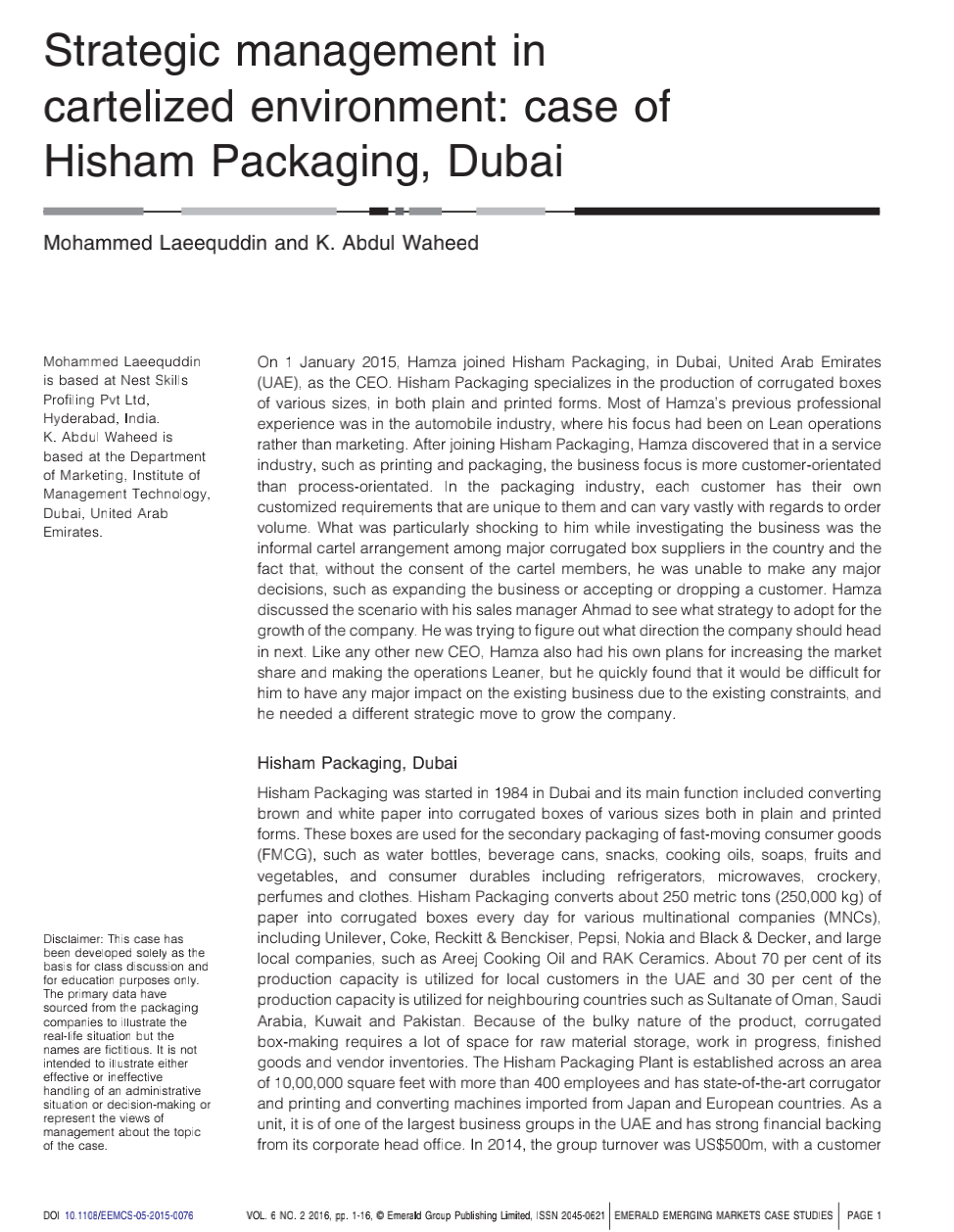Analyze the case of Hisham Packaging, Dubai using strengths, weaknesses, opportunities, and threats (SWOT) analysis
Analyze the case of Hisham Packaging, Dubai using strengths, weaknesses, opportunities, and threats (SWOT) analysis
Management, Loose-Leaf Version
13th Edition
ISBN:9781305969308
Author:Richard L. Daft
Publisher:Richard L. Daft
Chapter11: Managing Change And Innovation
Section: Chapter Questions
Problem 3CFCA
Related questions
Question
Analyze the case of Hisham Packaging, Dubai using strengths, weaknesses, opportunities, and threats (SWOT) analysis.

Transcribed Image Text:Strategic management in
cartelized environment: case of
Hisham Packaging, Dubai
Mohammed Laeequddin and K. Abdul Waheed
On 1 January 2015, Hamza joined Hisham Packaging, in Dubai, United Arab Emirates
(UAE), as the CEO. Hisham Packaging specializes in the production of corrugated boxes
of various sizes, in both plain and printed forms. Most of Hamza's previous professional
experience was in the automobile industry, where his focus had been on Lean operations
rather than marketing. After joining Hisham Packaging, Hamza discovered that in a service
industry, such as printing and packaging, the business focus is more customer-orientated
than process-orientated. In the packaging industry, each customer has their own
customized requirements that are unique to them and can vary vastly with regards to order
volume. What was particularly shocking to him while investigating the business was the
informal cartel arrangement among major corrugated box suppliers in the country and the
fact that, without the consent of the cartel members, he was unable to make any major
decisions, such as expanding the business or accepting or dropping a customer. Hamza
discussed the scenario with his sales manager Ahmad to see what strategy to adopt for the
growth of the company. He was trying to figure out what direction the company should head
in next. Like any other new CEO, Hamza also had his own plans for increasing the market
share and making the operations Leaner, but he quickly found that it would be difficult for
him to have any major impact on the existing business due to the existing constraints, and
he needed a different strategic move to grow the company.
Mohammed Laeequddin
is based at Nest Skills
Profiling Pvt Ltd,
Hyderabad, India.
K. Abdul Waheed is
based at the Department
of Marketing, Institute of
Management Technology,
Dubai, United Arab
Emirates.
Hisham Packaging, Dubai
Hisham Packaging was started in 1984 in Dubai and its main function included converting
brown and white paper into corrugated boxes of various sizes both in plain and printed
forms. These boxes are used for the secondary packaging of fast-moving consumer goods
(FMCG), such as water bottles, beverage cans, snacks, cooking oils, soaps, fruits and
vegetables, and consumer durables including refrigerators, microwaves, crockery,
perfumes and clothes. Hisham Packaging converts about 250 metric tons (250,000 kg) of
paper into corrugated boxes every day for various multinational companies (MNCS),
including Unilever, Coke, Reckitt & Benckiser, Pepsi, Nokia and Black & Decker, and large
local companies, such as Areej Cooking Oil and RAK Ceramics. About 70 per cent of its
production capacity is utilized for local customers in the UAE and 30 per cent of the
production capacity is utilized for neighbouring countries such as Sultanate of Oman, Saudi
Arabia, Kuwait and Pakistan. Because of the bulky nature of the product, corrugated
box-making requires a lot of space for raw material storage, work in progress, finished
goods and vendor inventories. The Hisham Packaging Plant is established across an area
of 10,00,000 square feet with more than 400 employees and has state-of-the-art corrugator
and printing and converting machines imported from Japan and European countries. As a
unit, it is of one of the largest business groups in the UAE and has strong financial backing
from its corporate head office. In 2014, the group turnover was US$500m, with a customer
Disclaimer: This case has
been developed solely as the
basis for class discussion and
for education purposes only.
The primary data have
sourced from the packaging
companies to illustrate the
real-life situation but the
names are fictitious. It is not
intended to ill ustrate either
effective or ineffective
handling of an administrative
situation or decision-making or
represent the views of
management about the topic
of the case.
DOI 10.1108/EEMCS-05-2015-0076
VOL. 6 NO. 2 2016, pp. 1-16, © Emerald Graup Publishing Limited, ISSN 2045-0621 EMERALD EMERGING MARKETS CASE STUDIES
PAGE 1
Expert Solution
This question has been solved!
Explore an expertly crafted, step-by-step solution for a thorough understanding of key concepts.
Step by step
Solved in 2 steps

Recommended textbooks for you

Management, Loose-Leaf Version
Management
ISBN:
9781305969308
Author:
Richard L. Daft
Publisher:
South-Western College Pub

Management, Loose-Leaf Version
Management
ISBN:
9781305969308
Author:
Richard L. Daft
Publisher:
South-Western College Pub